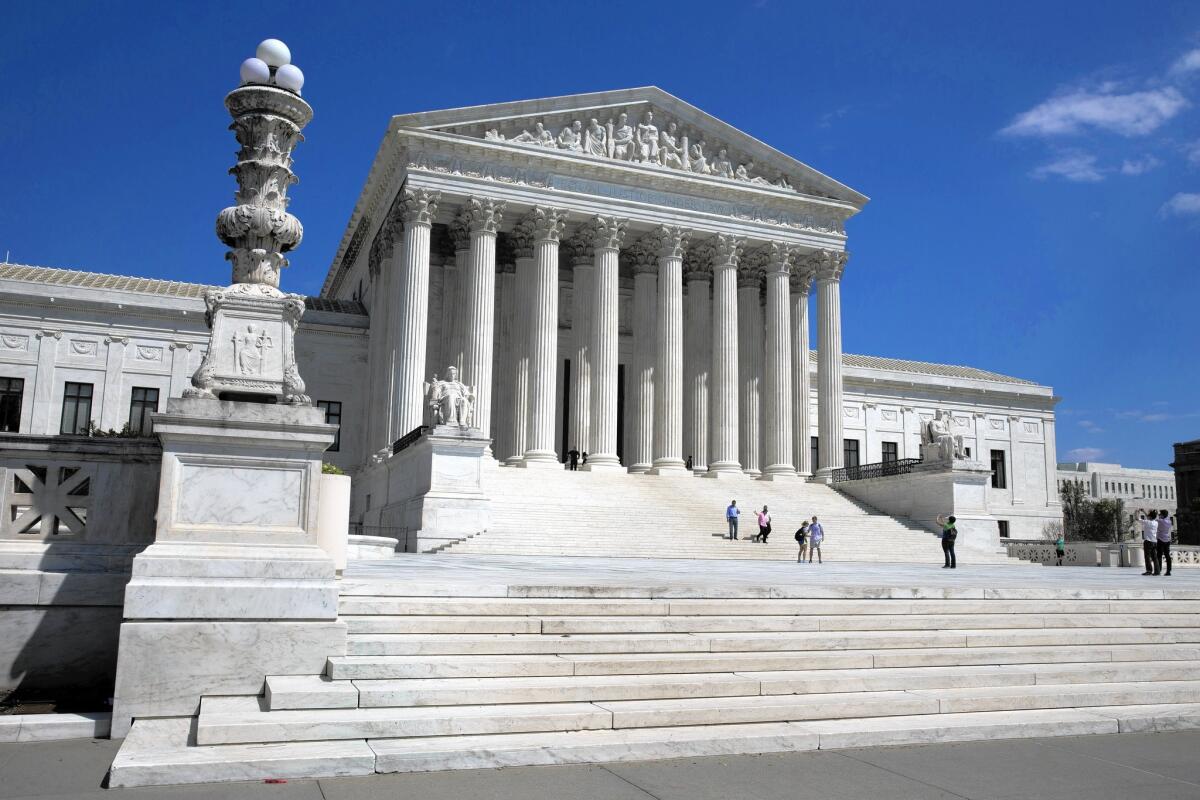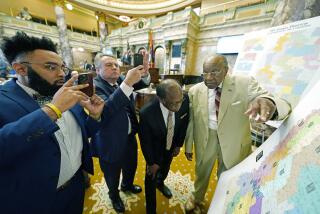Supreme Court to review independent redistricting commissions

- Share via
Reporting from WASHINGTON — The U.S. Supreme Court said Thursday that it had voted to hear 11 new cases, including a major challenge to the independent commissions created in California and Arizona that use citizens rather than state legislators to draw election districts for members of Congress.
The justices agreed to hear a complaint from Arizona state legislators who argue that they alone have redistricting power, regardless of what voters think.
They point to a provision in the U.S. Constitution that says “the times, places and manner of holding elections for senators and representatives shall be prescribed in each state by the legislature thereof.”
Washington attorney Paul Clement, representing Arizona’s Republican-controlled Legislature, said voters’ decision in 2000 to put the redistricting power in the hands of a citizens commission was a “radical measure.” The Legislature, he said, “is quite literally cut out of the process completely.”
Activists in Arizona who put the issue on the ballot said that was the point. They said partisan legislators should not have the authority to draw election districts, because they too often use the power to ensure the reelection of their favored candidates.
California voters approved a similar measure in 2010 that took the redistricting power away from the Democratic-controlled Legislature and created the California Citizens Redistricting Commission. It has been credited for impartially redrawing election districts, resulting in more closely contested races.
In February, a three-judge panel upheld Arizona’s redistricting commission. The 2-1 majority decided that when voters acted to amend the state’s constitution, they were acting as the Legislature.
But the Supreme Court said Thursday that it would hear the case of Arizona State Legislature vs. Arizona Independent Redistricting Commission.
The appeal notes that California’s commission was created by voters just as in Arizona. If the high court rules Arizona’s commission is unconstitutional, that will almost surely doom California’s.
Arizona’s lawyers added that Hawaii, Idaho, New Jersey and Washington have similar commissions, but they began with the consent of the legislatures there.
Separately Thursday, justices took no action on gay marriage cases that are pending from five states. They are likely to spend more time deciding which of them to hear.
Among the other new cases is a dispute over religion in the workplace. In EEOC vs. Abercrombie & Fitch Stores, the court will decide whether the retailer can be sued for religious discrimination because a store in Tulsa, Okla., refused to hire a Muslim teenager who wore a black head scarf.
The company says it has a “look policy” for its sales staff that is in keeping with its “classic East Coast collegiate style of clothing.”
Employees acknowledged that 17-year-old Samantha Elauf was disqualified in part because of her head scarf. But the company said its employees did not know she wore the hijab for religious reasons. The young woman sued and won a $20,000 verdict for a violation of federal civil rights law.
But the U.S. appeals court in Denver threw out the award and ruled the company was not liable because the teenager did not ask for a religious accommodation. Government attorneys appealed and argued that employers had a duty to “foresee a possible religious conflict” in such cases.
In Ohio vs. Darius, the court will decide whether teachers who see evidence that a child has been abused can testify in court as witnesses for the government. Laws in all 50 states require school employees to report when they see signs a child has been abused.
But the Ohio Supreme Court threw out the conviction of a Cleveland man charged in the abuse of a 3-year-old, who did not testify. Instead, a preschool teacher testified. In recent years, the court has limited who can testify as a witness.
In Williams-Yulee vs. Florida Bar, the court will decide whether elected judges have a free-speech right to solicit campaign contributions. Most states elect some or all of their judges, but at least 30 states also have laws or bar association rules that forbid candidates for these judgeships from personally seeking contributions.
More to Read
Sign up for Essential California
The most important California stories and recommendations in your inbox every morning.
You may occasionally receive promotional content from the Los Angeles Times.











